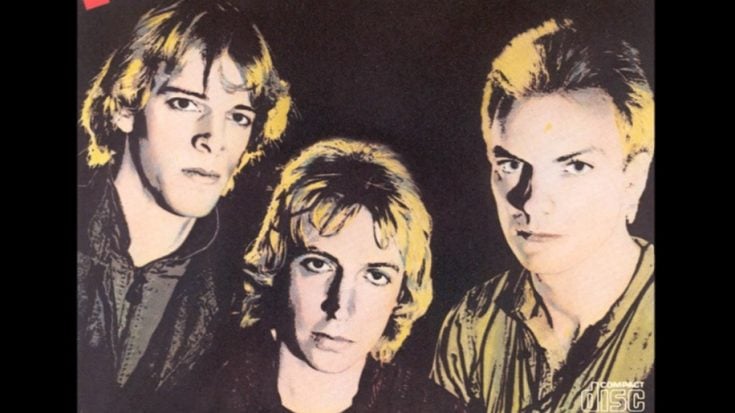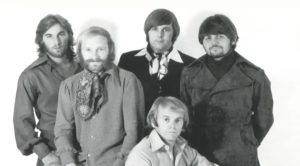What Really Happened When The Police Broke Up

Album cover for Outlandos D'Amour - La Lechita Bailarina / Youtube
Rock music’s thorny path of history is filled with all kinds of stories. There are stories that shimmer with the glory of musical triumph, and then there are tales of dissolution that leave fans forever yearning for answers.
The Police, one of the most iconic and influential bands of their era, delivered the world a treasure trove of timeless hits, only to vanish into the enigmatic depths of rock history.
The band reached the zenith of their career with the release of their final album, Synchronicity, in 1983. This remarkable album achieved staggering success, selling over 10 million copies worldwide, spawning three top 10 singles, and clinching three Grammy Awards.
It was even celebrated by the BBC as the “biggest band in the world.” Yet, in a perplexing turn of events, shortly after the album’s release, The Police disbanded without issuing an official statement. As their final curtain call drew near, the truth behind The Police’s break-up became shrouded in rumors, speculation, and secrecy.
Sting wanted to go solo
Guitarist Andy Summers revealed that the band’s lead vocalist and bassist, Sting, felt compelled to embark on a solo career, believing he no longer required the band’s collective presence.
While this decision held an allure for Sting at the time, it proved to be a heartrending blow to the other band members. Instead of publicizing The Police’s disbandment, their manager, Miles Copeland, opted to maintain secrecy.
This silence persisted for approximately a year until Summers, burdened by the untruth, finally revealed the band’s dissolution. Following the culmination of their Synchronicity tour in March 1984, each band member embarked on individual projects.
Sting launched his solo debut album, The Dream of the Blue Turtles, while drummer Stewart Copeland dedicated himself to a world music album and film project called The Rhythmatist.
Summers, on the other hand, collaborated with Robert Fripp on a second record. Although efforts were made to rekindle the band’s camaraderie, they proved fruitless and, as Summers describes it, “pathetic”.
Internal disagreements and age difference
Despite their towering fame at the time of their disbandment, internal disagreements remained a persistent source of tension, exacerbated by the significant age differences among the band members.
Unlike many groups that coalesced through shared experiences, The Police didn’t have the advantage of growing up together. Sting, who was nearly a decade younger than Summers, always viewed being in a band as a pursuit better suited for younger individuals.
In his eyes, it was akin to being part of a teenage gang, and with age came the inevitable transformation that made it challenging for them to continue their journey together.
Sting candidly expressed this sentiment when he remarked to Mojo, “I don’t think any grown man can be in a band, actually. A band is a teenage gang. Who wants to be in a teenage gang when you’re knocking 70? It doesn’t allow you to evolve.”
https://twitter.com/ReturnofR/status/1711491726454436108
Sting was really good at writing songs
As success surged, underlying tensions surfaced. Sting was frequently accused of dominating the songwriting process, whereas Copeland and Summers aspired to contribute more substantially.
The band found themselves in a paradox; they were selling out stadiums but struggled to find a balanced approach to their songwriting process. Sting’s perspective was that the songs composed by Copeland and Summers didn’t match the quality of his own compositions, creating an evident divide.
“Part of the frustration was that [they] were driven to write. It’s difficult to tell somebody it’s not a good song, and it was usually me,” Sting explained in 2007.
The frontman wasn’t one to mince words when it came to dismissing his bandmates’ efforts, going as far as stating he could have filled entire albums with his own material but had to accommodate their songs, a task akin to telling someone their girlfriend isn’t attractive.
A final album with an ironic name
Summers casts his gaze back to the band’s formative years, their struggle to gain footing in London’s punk scene, and their eventual breakthrough. He concedes that The Police didn’t quite fit the punk mold and were instead celebrated for their technical finesse.
As the punk wave waned, The Police discovered their niche and experienced a transformative moment during a performance in Bath, England, where they captivated the audience, thus propelling their meteoric success.
By the time The Police embarked on their swan song, Synchronicity, they had evolved into a thriving arena act. Despite swirling rumors of inner turmoil during the album’s creation, Summers fervently attests to the band’s unwavering musical synergy.
He firmly rebuffs the notion that they harbored animosity towards one another and credits their divergent personalities for crafting a distinctive and dynamic sound that resonated profoundly with audiences.
Reunions and recollections
“We did go back on an incredibly successful reunion [tour], so there has to be something there,” Summers reflects, alluding to The Police’s 2007 concert journey, a tour that, at the time, stood as the third-highest-grossing tour in history, amassing over $360 million in revenue.
“We have shared a past, that we all share together. It was probably the greatest thing in our lives, for all of us. We ain’t going to forget it. It’s who we are. So, I don’t really like it when people say, ‘Oh, there’s so much hate.’ No. You weren’t there. You don’t know that. You’re just going to the sort of tabloid line.”
However, before The Police’s monumental 2007 reunion, there was that aforementioned “underwhelming” attempt to regroup, shortly after Synchronicity, in July 1986. “There was always, ‘Are they going to get back together? God, we hope so, we really hope so, ‘cause there’s so much money there!'” Summers chuckles.
“It could have maybe had a chance. But the problem, actually, in real-life terms, was that we were going to be in the studio in the North of London. And then the night before we went in [to work on a proposed Synchronicity follow-up], Stewart went out on a horse, fell off, broke his collarbone, and couldn’t play drums. End of story.”













